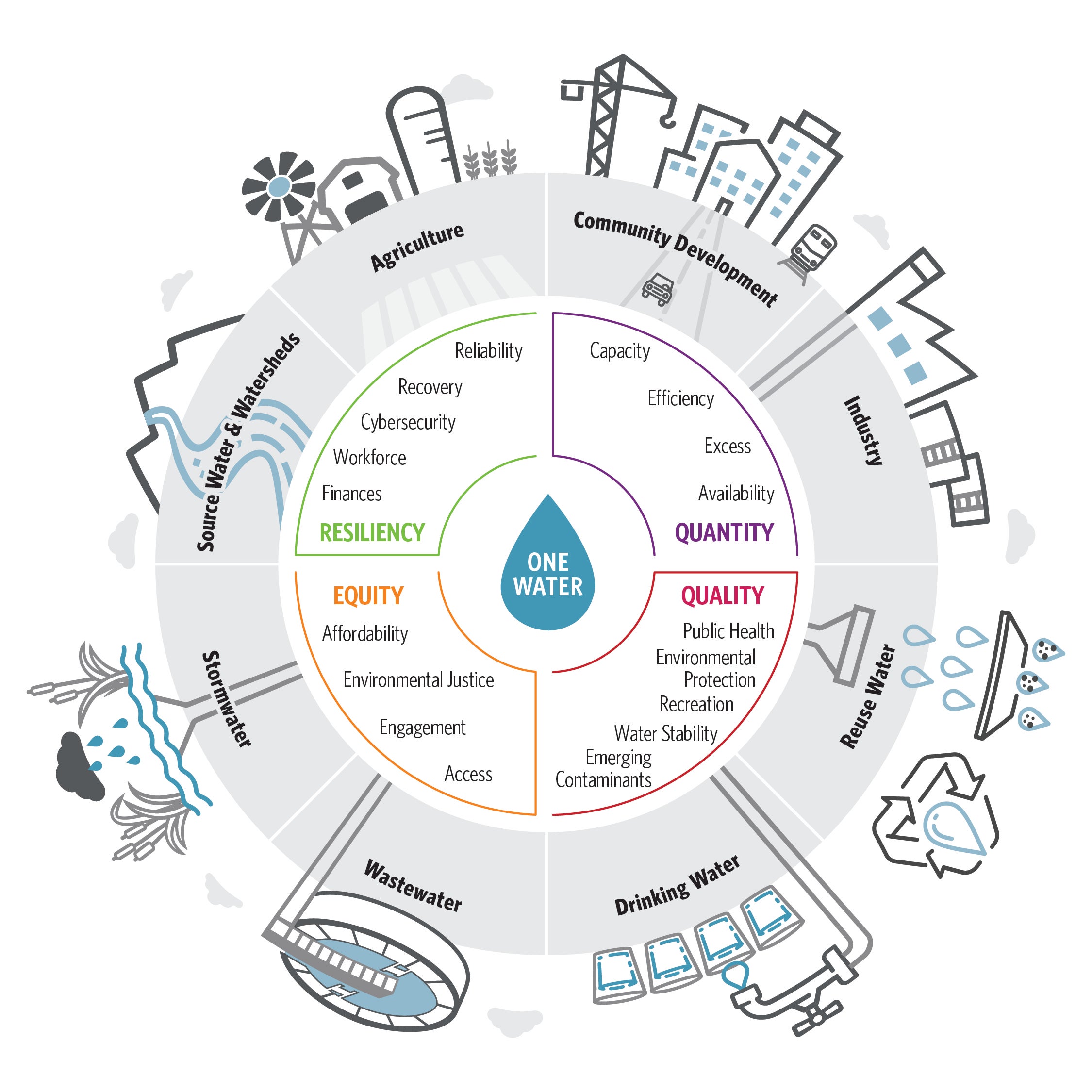
Why One Water?
Securing Affordable, Equitable Water Resilience
Communities around the world face unprecedented water challenges. These challenges include a changing climate with increasingly severe droughts and extreme flooding, shifting population and demand patterns, ageing infrastructure with limited funding, changing economic conditions, reduced workforce, geopolitical conflict, and stringent regulations for conventional and emerging contaminants. Our communities need support to navigate this shifting landscape.
Meeting these diverse and evolving challenges requires a novel approach to thinking about water infrastructure, policies and partnerships. The water sector can no longer afford to operate in silos; today’s challenges require sectors to work together, consider new overarching water policies, and approach water planning, projects and programs from a more holistic perspective. Our One Water approach offers the opportunity to overcome these challenges and unlock a future of continued affordable and equitable water access and long-term system resiliency.
Our One Water Approach
One Water is an approach that considers the interconnectivity among all phases of the hydrologic cycle in our communities and regions, leveraging partnerships needed to address today’s water challenges and opportunities. The linkages between watersheds, drinking water, stormwater, wastewater, urban development, agriculture, and industry create both complex challenges and unique opportunities for holistic solutions that respect the universal value of water.
Applying a One Water approach — or One Water lens — connects all elements of the water cycle in our communities and environment. One Water capitalises on this interconnectedness to develop solutions that offer multiple benefits — exceeding the impact of traditional stand-alone projects — while helping communities meet their goals efficiently and sustainably.
At HDR, we define this general philosophy of approaching water planning through a wider lens as One Water planning.
Our One Water mission aims to assist our clients in securing a future of affordable and equitable access to clean water, sustainable water supplies, reliable wastewater services, protection from floods, and thriving ecosystems to support the continued prosperity of our communities and regions.
A One Water lens has application throughout the implementation of water policy development, planning efforts, projects and programs. Applying a One Water lens will allow water sector leaders to identify community, watershed and project needs; partnerships beyond traditional institutional boundaries; and goals to best manage our critical water resources to maximise and prioritise multi-benefit solutions.
Our overall approach to policy development, planning efforts, projects, and programs embraces and assimilates a One Water lens through the following approach.
Assess Scale: Valuable insights can be gleaned by contextualising the scale of the upcoming investment at the regional watershed scale, community scale and individual interrelated project scale. Understanding the investment’s larger context can lead to uncovering broader and more far-reaching benefits or burdens and ultimately provide more holistic solutions. For example, when a facility rehabilitation project is in an underserved community, there is a community-level opportunity to meaningfully engage and design a project that creates community-level benefits or to identify the community’s preferred minimisation and mitigation for adverse impacts. The facility rehabilitation project may create a regional opportunity with direct implications for shared permitting at the regional or watershed level.
Explore Partnerships: Exploring opportunities for partnership, collaboration and leadership involves evaluating both interagency and intra-agency alignments that provide opportunities for optimising policy, program and individual project implementation for multifaceted community or regional benefit. The broad cross-sector categories that should be explored could include but are not limited to partners representing source water and watersheds, drinking water, stormwater, wastewater, reuse water, agriculture, community development and industry.
Establish One Water Goals, Strategies and Actions: Establish One Water goals that meet a policy, plan, project or program’s needs such as water quantity, water quality, equity and resiliency. These goals reflect the evolution of community water needs, which have traditionally focused on conveying floodwaters, maintaining adequate water supplies, providing safe drinking water, and protecting water quality to support recreation and aquatic life. However, these traditional quantity and quality focus areas are becoming more challenging as climate events affect our water cycle, and as diverse community growth and agricultural intensification stress our multiuse water resources and ecosystems. Climate impacts have exposed the need for more resilient water infrastructure, and the water sector recognises the need to develop regional solutions and become more organisationally resilient. Communities are increasingly focused on providing equitable and affordable services to all residents and mitigating historic infrastructure impacts to under-resourced and vulnerable areas. Each One Water goal involves developing multiple strategies and specific measurable actions potentially serving as the policy, plan, project or program’s key performance indicators.
Foster Continuous Stakeholder Engagement: Continuous stakeholder engagement will guide the development of policies, plans, projects and programs, providing an opportunity to implement more sustainable, holistic and multi-benefit solutions. To plan with purpose, foster understanding, seek all voices and create a future where everyone moves forward together is not simple and requires a layered stakeholder engagement process that involves stakeholders at appropriate levels and opportune moments.
We recognise that communities face different challenges based on local and regional drivers. Therefore, a One Water approach cannot be a prescriptive one-size-fits-all solution. Instead, our approach aims to guide the development of locally tailored solutions that best fit the unique needs of our partners. We strive to empower our clients to find new opportunities, forge new partnerships and look to the future to maximise the benefits of One Water in our communities.







